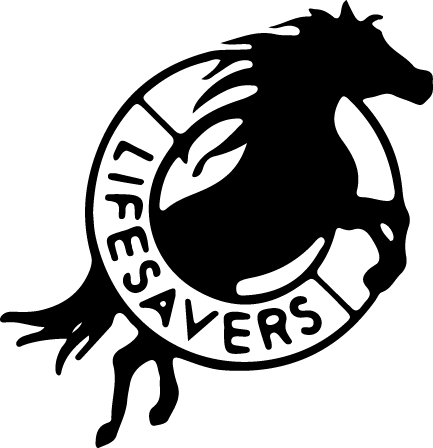rescue
Mustangs come to Lifesavers from a variety of sources and for many different reasons. Some come from the various government agencies responsible for wild horse management, such as the Bureau of Land Management and the Nevada Department of Agriculture. In these cases, the horses are wild and are at risk of being sent to a slaughter auction.
Other horses are surrendered by their owners, who adopt or purchase them and later realize they don’t have the time, knowledge, or resources to properly train or care for a horse. Sometimes we are contacted by local animal control agencies and asked to take a horse that has been seized from an abuse or neglect situation. Many of our rescued horses were purchased from public auctions to prevent them from going to the “killer buyers,” who buy and sell unwanted horses for meat. Every year, over 20,000 American horses are slaughtered for human consumption.
Currently, we care for over 400 horses between our main ranch and our sanctuary. Most of our horses were saved from slaughter auctions. Their final destination would have been a dinner plate overseas after being butchered either in Mexico or Canada. Last year more than 160,000 horses were sent to slaughter. These horses were once someone’s pet, a racehorse that no longer won large purses, an unwanted by-product of Premarin (hormone replacement therapy) production, or a Mustang that was removed from its natural habitat.
the story of Rains…
Below is a photo of Rains, an older Arab mare found wandering the wide-open desert. We called her Rains because when it rains it pours. We do not really know exactly how long she had been wandering around with no food or water, we followed the hoof prints that she left in the desert where she was found - they led to nowhere but circles. So we think she must have been dropped off and left to die. When we got her off of the horse trailer back at our ranch she could barely use her back legs. She could walk, but not very well. She would walk normally with her front feet and then drag her back feet behind her. She was SO dehydrated that when we gave her grain soaked in water, she would take a mouth full and then suck all the water out and then eat the grain. Rains was severely underweight and we hoped that she would make a comeback, but when horses are this malnourished sometimes their bodies can't perform any longer. We were only able to feed her a little at a time until her digestive system was used to food again. She spent a long time just getting her weight and muscle back. Eventually, her prior neglect got the best of her but not before we loved her for almost five years. This type of rescue and care could not happen without your help.


